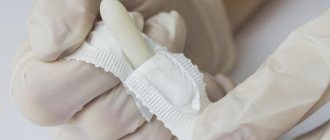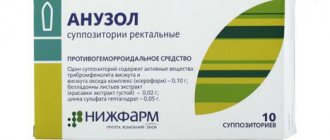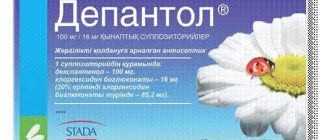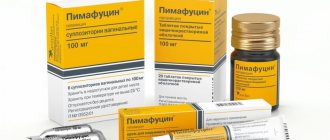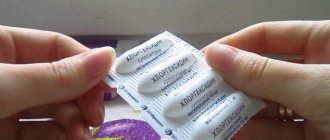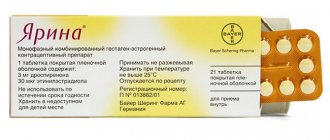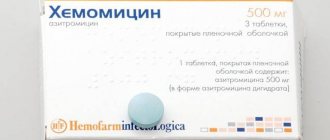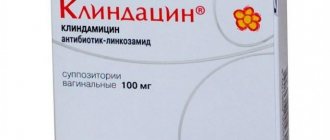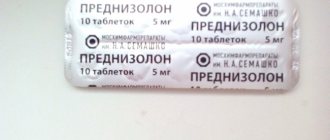Betadine is a powerful disinfectant and antiseptic. Effective against viruses, fungi, cocci, E. coli and other types of pathogens of pathological infection, except Koch's bacillus.
After introducing the Betadine suppository into the vagina, the active substance begins to decompose, releasing iodine, due to which all pathogens, viruses, and fungi are destroyed. The mechanism of action of the main active substance of the suppository is its binding to the proteins of the cells of the infectious pathogen, which leads to their coagulation (clotting and death).
The drug does not have a toxic effect, but it is not recommended to use it without a doctor’s prescription.
What are Betadine suppositories?
This drug is a strong disinfectant, provides an antiseptic effect, and is widely used in gynecology. In contact with the skin and mucous membrane, the iodine included in the composition activates its bactericidal properties. Suppositories help fight viruses and fungi, various types of infectious agents that lead to diseases. The medicine is not able to counteract only Koch's wand. It is also available in the form of an ointment and solution, has a number of analogues, a cheap price and good reviews.
Description of the drug
Betadine is an antiseptic and disinfectant intended for local use. These suppositories are quite popular among gynecologists because they can be used in the treatment of pregnant patients.
In the process of bearing a baby, the immune status is seriously suppressed, and therefore the genital area of patients becomes defenseless against attacks from even opportunistic microorganisms. To eliminate sexually transmitted infections, narrow-profile medications or with a wide range of therapeutic effects are prescribed. The latter include Betadine.
The medication is used in the treatment of many pathologies and is available in a variety of dosage forms. For pregnant patients, the drug is prescribed in the form of suppositories, because suppositories work locally and are therefore safe for fetal development. Betadine suppositories during pregnancy in the first trimester help the mother cope with the most dangerous infections that can negatively affect the processes of initiation and formation of the main fetal structures.
The active component of Betadine suppositories is povidone-iodine, of which each suppository contains 200 mg. Externally, suppositories look like brown torpedo-shaped candles. Macrogol is an auxiliary component of the drug.
Compound
The main active ingredient of vaginal suppositories is povidone-iodine (200 mg equals 20 mg of active iodine), the excipient is macrogol. The package consists of 7 candles. Iodine has an antiseptic effect by blocking cell proteins. It is triggered immediately after contact begins, provoking the death of harmful bacteria. Efficiency has been proven in the treatment of diseases caused by bacteria of the genus Candida, which provoke the development of trichomoniasis. In addition to the main one, the composition includes a number of additional substances:
- nonoxynol;
- glycerol;
- sodium hydroxide;
- anhydrous acid;
- purified water.
Is it safe in the first trimester?
Since most drugs are strictly prohibited for pregnant women. The excitement of many mothers who are prescribed Betadine suppositories is understandable. It is in the early gestational stages that this antiseptic is used, because it is completely safe for the child. Therefore, there is no need to worry with such appointments.
But in the 2-3 trimester of gestation, suppositories are prescribed extremely rarely. It just can have a negative effect on the child if used for a long time. Since the main active element of suppositories is povidone-iodine, if used incorrectly or too often, Betadine can negatively affect the development of the baby’s thyroid gland and provoke congenital pathologies. This is why Betadine is rarely prescribed to pregnant women in the 2nd-3rd trimester.
pharmachologic effect
After administration, the suppository begins to dissolve, releasing iodine. At the same time, pathogenic microorganisms are destroyed: fungi and viruses. The action of the active substance of the suppository is based on its binding by proteins of bacterial cells, which leads to their coagulation and further death. The molecules of the drug are very large, so they cannot enter the general bloodstream and have a local effect. Iodine slowly penetrates deeply, so the therapeutic effect can be maintained for a long time.
What is it prescribed for?
The medicine will help get rid of infectious diseases of the genital area - vaginal infections. The drug is prescribed for:
- treatment of the diagnosis of bacterial vaginitis (a disease caused by a mixed or nonspecific infection, bacterial vaginitis);
- getting rid of vaginosis caused by microorganisms;
- treatment of candidiasis caused by fungi;
- sexually transmitted trichomoniasis;
- vaginal infections that occur after taking steroids or other drugs;
- treatment of cervical erosion;
- treatment of thrush;
- preventive use before medical interventions.
annotation
Let's look at why Betadine suppositories and other forms of this drug are prescribed. Vaginal capsules are used to cleanse the vagina of bacteria during diagnostic procedures, before and after surgery, as well as in the complex treatment of diseases such as vaginitis, trichomoniasis and fungal infections . Diseases of the genital organs, formed as a result of fungal activity, often occur during the use of steroid and antibacterial pharmaceutical products.
Betadine ointment is used in the treatment of infectious skin diseases, bedsores and various ulcers, as well as to prevent infection when the integrity of the skin is damaged. The solution is used for the following purposes:
- when inserting a catheter, performing a biopsy, punctures and injections;
- for disinfection of the skin before surgery;
- for disinfection of burns, household and industrial injuries.
Instructions for use of Betadine suppositories
The use of vaginal suppositories is carried out in different dosages and schedules, depending on the diagnosis. According to the instructions, suppositories with betadine are used as follows:
- For acute vaginitis (inflammation) - administration of 1 suppository 1-2 times a day for a week.
- For chronic vaginitis - use 1 suppository 1 time before bedtime. The course of treatment lasts from 14 days.
- For disease prevention - use 1 suppository per day in the evening for 5 days.
How to use suppositories
Before starting the procedure, it is mandatory to carry out hygiene procedures (wash your hands and external genitalia). Then, before insertion into the vagina, you need to moisten the suppository. It is injected deeply, with caution, 3-4 cm. Under the influence of natural body temperature, it quickly dissolves, enveloping the walls of the vaginal mucosa, reducing pain.
It is most convenient to do this manipulation while lying down. Then you need to lie down and relax for about an hour so that the drug is evenly distributed throughout the mucous membrane and has time to have the desired effect. In this regard, it is recommended to use it before bedtime. On days of using candles, use sanitary pads to avoid staining your underwear, as candles leak out in small quantities anyway. A decrease in brown color saturation indicates the effectiveness of the product.
Indications
What are the indications for the use of Betadine? Suppositories of this drug are intended for vaginal administration, so the drug is actively used for the treatment of gynecological diseases.
Betadine is used to treat:
- Vaginitis of various etiologies;
- Vaginosis, mainly caused by bacteria;
- Candidiasis;
- Mycoplasmosis;
- Chlamydia;
- Trichomoniasis. In this case, Betadine is prescribed in complex treatment;
- Genital herpes;
- Vaginal infections caused by a fungal nature, occurring after treatment with antibiotics and steroid medications;
Betadine is also used to prevent infection after surgical, gynecological interventions and diagnostic procedures. For example, suppositories are used before the introduction of an intrauterine device, treatment of erosions, uterine fibroids, infertility, removal of polyps, curettage and abortion.
Betadine is an effective remedy in the fight against these diseases, because it begins to act immediately after insertion into the vagina. In addition, microorganisms do not develop resistance to the drug, and Betadine does not reduce its therapeutic effect even with repeated treatment of the disease.
Candles help get rid of the following problems:
- Itching and burning, as well as other unpleasant sensations in the vagina;
- Vaginal discharge of a cheesy type;
- Painful urination.
After discontinuation of Betadine, unlike antibiotics, the vaginal microflora is quickly restored. Another advantage of suppositories is that they are made on a water-soluble basis, so they do not cause irritation to the vagina.
Betadine for menstruation
It often happens that the gynecologist prescribed a course of therapy several days before the onset of her critical days, and the woman wonders about the advisability of using it during this period. If possible, it is better to postpone the course, but if treatment has been started, then you should try not to interrupt it. If you feel discomfort, you should stop using iodine suppositories in gynecology until the end of your period. In any case, consultation with a specialist is necessary, because the therapeutic effect decreases during menstruation. This is due to the rapid elimination of the substance through secretions.
Candles during pregnancy and lactation
It has been proven that iodine does not negatively affect the unborn baby and does not cause mutations. However, the use of vaginal suppositories in the 1st trimester of pregnancy is not recommended by gynecologists. The substance actively penetrates the placenta, and in large dosages can negatively affect the thyroid glands of the fetus. The use of the drug at a later stage of pregnancy is allowed after the doctor has assessed all possible risks.
When treating with Betadine during pregnancy, constant monitoring is carried out: tests are taken, the condition of the thyroid gland of the mother and child is checked. During lactation, treatment with suppositories is possible, but only under the strict supervision of a specialist. The medicine almost does not enter the bloodstream, so the active ingredients of the drug are not able to penetrate to the newborn and cause harm.
- Beef liver: recipes with photos
- How to make honey cake for cough
- Red sea bass baked in the oven with vegetables
special instructions
The drug has many special instructions that should be taken into account when prescribing it to pregnant women.
- Povidone-iodine has oxidizing properties, so traces of it can cause false-positive results in diagnostic tests, for example, to detect occult blood in stool or glucose and blood in urine.
- During the course of therapy, iodine absorption by the thyroid gland may be inhibited, which also affects the results of some diagnostic procedures such as identifying the protein-bound fraction of iodine, thyroid scintigraphy, etc.
- In addition, Betadine is able to bind with other iodine drugs, for example, those used to eliminate thyroid pathologies. To obtain undistorted scintigraphic studies, after long-term use of the drug, you should live for quite a long time without taking povidone-iodine.
- If the patient suffers from thyroid dysfunction, then she can use Betadine in therapy only after appropriate medical prescription.
- Betadine should be taken very carefully if the patient has previously diagnosed kidney failure.
- If the patient receives lithium-based drugs, then taking Betadine suppositories is highly not recommended.
- The drug has no effect on the ability to control complex mechanisms and vehicles.
- Suppositories are not prescribed in combination with silver, toluidine, hydrogen peroxide, because the active components of these drugs provoke a decrease in the effectiveness of the medication.
- It is also not prescribed in combination with mercury, alkaloid salts and silver, salicylic or tannic acid, or bismuth salts.
It is better to store suppositories in the refrigerator at a temperature of 5-15 degrees, where children cannot enter.
Side effects
The use of any medications is overshadowed by the possibility of adverse reactions, and betadine suppositories are no exception. The use of the medication may cause reactions such as:
- swelling or itching of the skin and mucous membrane;
- the development of contact dermatitis, during which red rashes similar to psoriasis form;
- hyperthyroidism.
Vaginal suppositories with iodine can contribute to an increase in the level of this substance in the blood, which makes it possible to develop thyrotoxicosis. This disorder is only possible if there is a genetic predisposition. Isolated cases of anaphylactic shock and symptoms similar to psoriasis (trichophytia) have been recorded. Abuse of suppositories can lead to an increase in blood sodium levels.
Overdose
In case of an overdose of this drug, symptoms of acute iodine poisoning develop . This pathological condition is accompanied by increased salivation, pain in the mouth and pharynx, as well as irritation of the visual organs. The patient experiences a metallic taste in the mouth and heartburn.
An overdose can cause disruptions in the functioning of the gastrointestinal tract, allergic reactions and anuria, kidney dysfunction, and swelling of the larynx, accompanied by suffocation. In especially severe cases, decompensation of blood circulation, increased concentration of sodium in the blood plasma, pulmonary edema and metabolic acidosis are observed.
This condition requires immediate intervention from specialists to eliminate the symptoms of poisoning. In addition, careful monitoring and monitoring of the functioning of the thyroid gland, kidneys and other internal organs will be required. Therapy for iodine poisoning includes normalization of water and electrolyte balance.
Iodine poisoning resulting from accidental internal use of the drug requires immediate measures to lavage the stomach. During the rehabilitation period, you must adhere to a special diet, which includes the consumption of foods rich in protein and starch. In certain situations, it may be necessary to use an antidote (ten percent antichlor) in the form of intravenous injections every three hours.
When treating an overdose of Betadine, an analysis of the activity of the thyroid gland is mandatory in order to prevent the development of thyrotoxicosis.
Contraindications
This medication has its own contraindications for use. These include:
- diseases of the thyroid gland, incl. and tumors;
- period of radioactive iodine therapy;
- hepatitis herpetiformis;
- taking antibiotics;
- age up to 8 years.
Patients with chronic infectious or fungal diseases should not use suppositories if they are accompanied by constant itching and rashes. This is due to the fact that iodine, which is the main active ingredient of the drug, increases the unpleasant manifestations of these diseases and affects the functions of the thyroid gland. Suppositories are also contraindicated for expectant mothers in the first trimester of pregnancy.
Summary
Despite the simple biochemical composition, the absence of antibiotics and minor contraindications, the product helps eliminate pathogenic microbes, does not disturb the vaginal flora and does not cause damage to the body. Betadine candles boast these valuable qualities. Reviews from gynecologists are mostly good. This medicine will definitely not disappear from the list of prescriptions and will be used for the correction of pathological conditions of the female genital area for a long time. The drug "Povidone-Iodine" will give odds to newfangled modern medicines. Don't neglect your own health!
Price
You can buy candles cheaply in almost any pharmacy in the country. Using the Internet, you can easily find out how much Betadine suppositories cost in a particular pharmacy, order them from a photo from a drug catalog, or buy them in an online store. The price range depends on the form of release of the drug; it can be considered inexpensive. The average cost (Moscow) looks like this:
| Betadine release form | Price, rub |
| Solution for external use 0.1, 30 ml | 156 |
| Ointment 0.1, 20 g | 261 |
| Solution for external use 0.1, 120 ml | 285 |
| Vaginal suppositories 200 mg n7 | 370 |
| Vaginal suppositories 200 mg n14 | 490 |
Reviews from women
Some reviews from women who used Betadine suppositories for treatment:
- Marina. These suppositories helped me very well with the inflammatory process of the genital area. I was advised by a friend who also used Betadine and was satisfied with the result of the treatment. I immediately bought them at the pharmacy (they cost, by the way, they are inexpensive, pharmacists do not require a prescription or a gynecologist’s appointment), so as not to put off the treatment for a long time. Betadine suppositories also helped me, I put them on as a course, and colds stopped bothering me.
- Angelina. The drug Betadine in suppositories was personally prescribed to me by the doctor before and after the operation. Before - for sanitation, after - so that no infection occurs. I can’t say anything bad about this medicine, candles are like candles, you put them on and sleep.. The doctor was pleased with the condition of my mucous membranes, which means that Betadmn coped with its task.
- Anna. I treated a fungal infection with Betadine suppositories. I studied information on this topic, such infections are very susceptible to antiseptics. in particular, to iodine, which is precisely what Betadine contains. The fact that these suppositories are effective is obvious both from the cessation of unpleasant symptoms and from the tests that I took after treatment to make sure that everything was clean and I could sleep peacefully)
Reviews of Betadine suppositories are generally positive: women note that with the help of this drug they were able to cope with the manifestations of thrush.
Storage conditions
Store at temperatures between 5°C and 15°C, in a cool, dry place.
Keep out of the reach of children!
Conditions for dispensing from pharmacies
Over the counter.
